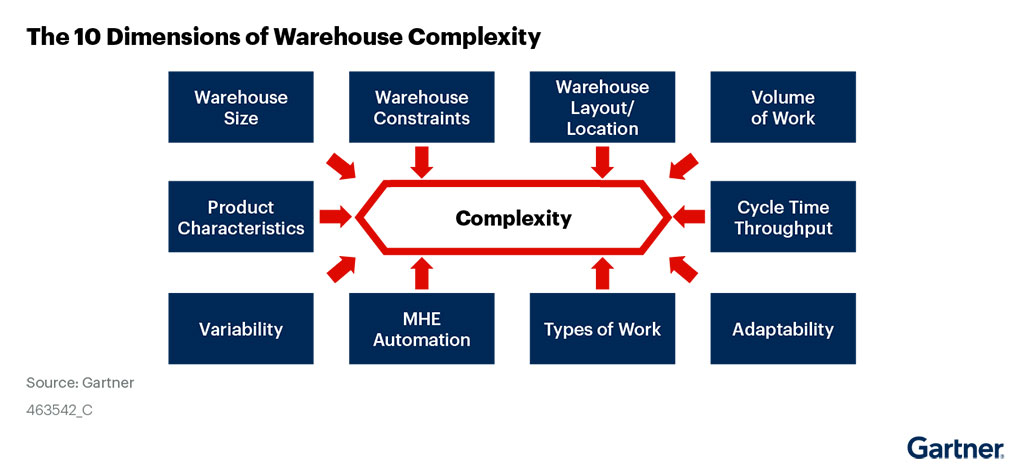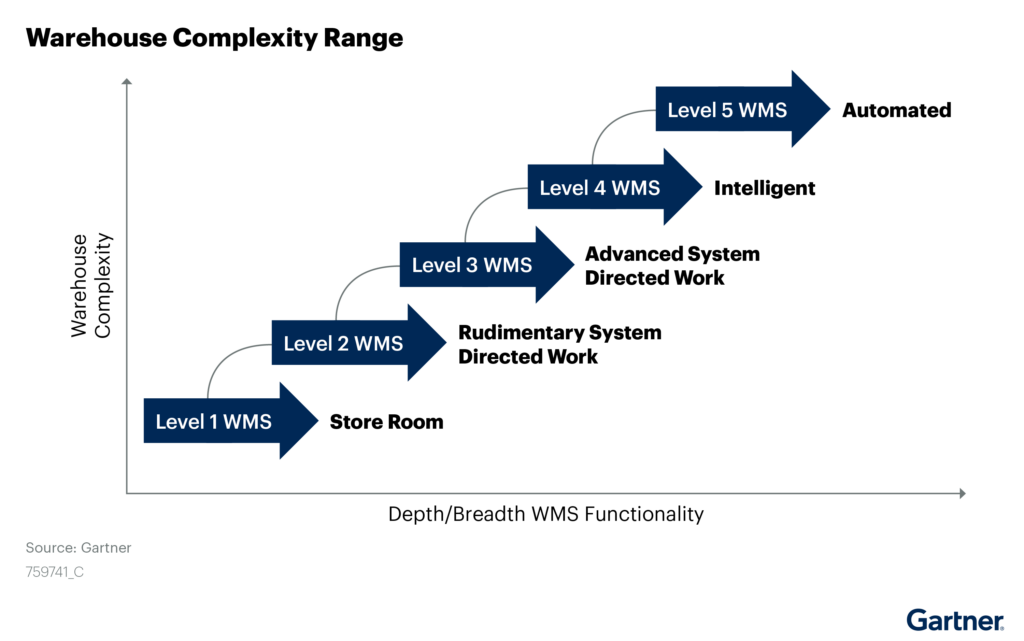We’re all accustomed to the old way of doing things. You go to the store to pick up a bushel of apples, but none are on the sales floor. So you ask the employee in produce if perhaps they have any in the back that they haven’t yet stocked. The worker checks the stockroom, and returns with one fresh bushel of apples. At the time you may not have realize dit, but this is a prime example of benefiting from a warehouse management system.
Today’s marketplace functions similarly, but on a much grander scale. The internet ties together consumers and vendors that are often nowhere near each other in terms of geography. Now the customer, the store, and sometimes even the produce employee are all in different locations, but you still want that bushel of apples, and the worker can simply “check in the back”. Vendors need a better way to track inventory and anticipate order fulfillment demands in real-time and that’s where WMS, or warehouse management systems come into play.
An Overview Of Warehouse Management Systems
WMS is software designed to give businesses an in-depth overview of the inventory at any given moment in time. This provides management personnel the insight required to properly manage supplies and ensure supply chain fulfillment operations run smoothly at each transaction stage.
Each stage is accounted for, from a product’s arrival to its sale and delivery. WMS processes products from the manufacturer or wholesale distributor and logs them into your system while they remain safely stored in your warehouse.
From there, the products might ship off to your store locations or directly to the consumer if that’s your business model. WMS follows the product from the distribution center to the store shelf, ultimately all the way until it reaches the customer.
What makes WMS an integral part of this transaction is the visibility it provides. Upper management can take a snapshot at any point of the process to see how efficiently the warehouse functions.
Warehouse staff can monitor inventory and have a good idea of what’s in stock and how fast they can meet ordering demands. In-store staff, if this is part of the operation, also can check in on the warehouse to give the customer a reasonable expectation on when any product that isn’t on the shelf may arrive.
Overall, WMS takes a tried-and-true practice and supersizes it to accommodate for the speed and demands of today’s massive marketplace.
Why Use A WMS?
The Internet has been a blessing and a curse for today’s modern marketplace. On the one hand, consumers can access businesses and products that are not physically located nearby. Likewise, companies can now reach customers that would otherwise have no access to their products, allowing them to tap a wider audience of consumers.
On the flip side, businesses, regardless of location, now compete with virtually every other business in the space. As a result, customers no longer feel the need to frequent the same independent shops in their area to scavenge for specialty items. Instead, everything they need is often just one click away.
This means that today’s marketplace is now operating on a larger scale and at a greater speed. Using dedicated WMS software for your operation will allow the organization to manage these two factors effectively.
Since all levels of the operation now have eyes on what’s coming in and going out of the warehouse, everyone is on the same page. Employees at the lowest hierarchical levels have the means to do their jobs efficiently and manage customer expectations realistically. In the event of any snafus, employees have the tools to remain proactive during their dealings with customers.

When snags in the supply chain or inventory issues arise, it’s more than just informing the customer. The feedback is invaluable to warehouse staff and upper management, who can troubleshoot and identify why a problem exists. For example, it may be a matter of ordering too few of a popular item, an issue with the manufacturer, other areas of the supply chain, or some other anomaly that is not easily explained.
Regardless, that feedback allows the organization to strategize to ensure the problem does not repeat. This leads to improved order speed and efficiency, leveraging the organization as a power player in the field.
In a saturated marketplace, the ability to keep product fulfillment seamless and smooth is paramount. Customers are always in search of better deals and services, and they are not apt to stick with a company that can’t manage their inventory or meet ordering demands.

What Are the Benefits Of A Warehouse Management System?
There are several benefits associated with WMS software, which include the following:
Increased Operations Speed
Remember our example of the produce employee checking the back for that bushel of apples? Imagine if they didn’t even have to walk away from the customer to “check the back.” Instead, they could use a computer station on the sales floor to verify availability. Better yet, they could “check the back” from a smartphone app and never even walk away from the inquisitive customer.
Today’s customer is often impatient, so this has its uses. Lets supersize the concept even more. Now the worker isn’t checking just the storeroom in their store. Instead, they can check every storeroom of every store, the warehouse, and anywhere else those apples may be available, all this with just a few quick clicks or taps on a touchscreen. WMS provides unbeatable speed, catering to even the most impatient of customers.
Operations Of Scale
With improved operational speed and efficiency, businesses and vendors that once served a small niche market now have tools to tap into wider markets. This allows a modest business to gradually scale into a multimillion-dollar industry leader if the tools and operations are managed properly.
As the business expands, communications from all departments and locations will use WMS regularly to keep abreast of needs and demands. So as the numbers get bigger, the processes remain the same. Ultimately, WMS gives companies the tools to expand and become even more established in their industry.
Profits
Let’s be real here–speed and scalability are only as useful as the return on investment. It’s a noble goal to want to be an innovator in your industry or provide a product or service that the market or consumer has never known.
However, realistically, most businesses are not reinventing the wheel, though. Many are offering similar services or products as their competitors, and it’s not a question of the better product but how easy it is to shop with the business that’s providing the product.
WMS helps streamline all processes and allows workers and management alike to keep a handle on top of issues no matter the size or scale. It provides speed and efficiency across all stages of fulfillment. From receiving the product to shipping it out, everything is accounted for without the physical need to go “check the back.”
All this translates to a bigger bottom line and more money funneled back into operations. This capital may be used to expand, improve the business’s range of services or product selection, or perhaps a nice increase in the salaries of all employees.
Nothing wrong with earning a little extra dough, right?
Are There Drawbacks To Warehouse Management Systems?
As with all computer systems, there are some areas where WMS is not perfect. Some potential drawbacks to WMS include:
Human Error
Products coming into the warehouse must be accounted for, and putting eyes on them as they are received is integral. For example, if a warehouse receives several pallets of merchandise and the picking sheet states that everything was delivered as ordered, then the employees checking it in will update the WMS to reflect that incoming order. The computer now assumes everything the business asked for arrived as planned.
But what if something was missing? What if an employee packing the order forgot to pack a box on the palette? Without human oversight, the computer may record mistakes that may not be realized until the stock runs low. Only at that crucial moment when the customer asks for a product that’s “in stock” but nowhere to be found will anyone be the wiser.
For this reason, it’s not 100% foolproof. Your warehouse staff must remain vigilant to check in merchandise properly and reconcile inventory discrepancies. Staying proactive to ensure the WMS is accurate will correct these situations before they cause any actual problem in the sales process.
Upfront Costs
There are some free add-on versions of WMS software, but often they lack the features that allow a business to truly take the reins of operations. The best ones involve premium subscriptions that add a variable cost to your budget.
Some frugal owners may think this is an extraneous or unnecessary cost, but the benefits that allow for operations to scale to massive size more than make up for the negligible cost. Typically, businesses using WMS realize great returns on investment versus those that prefer to track inventory with internal, cursory programs that lack the power and efficiency of a dedicated WMS.
WMS takes today’s marketplace, which is massive, and helps make it much more manageable. There are also many types of WMS to leverage the best benefit for the cost of the services.
Work With Orases To Improve Supply Chain Management Processes
Only a few years ago, business was operating at a snail’s pace compared to today’s standards. However, with so many new players entering the field, it’s imperative that any company that wants to enjoy longevity in the space to account for marketplace changes and implement solutions that solve those problems before they become actual problems on an operational level.
WMS gives a business the tools it needs to stay competitive and succeed in an increasingly challenging economy. It’s never been more crucial for a business to integrate the use of WMS into their organization, and WMS allows a company to realize their true potential.
There are many reasons a business should adopt WMS software, and Orases can help. Orases builds custom software solutions for their clients so that you don’t have to sacrifice any features or functionality. Everything you want in your perfect WMS can be yours.
Ready to get started implementing your own warehouse management system? Contact Orases today to find out how their solutions can help improve your business!






